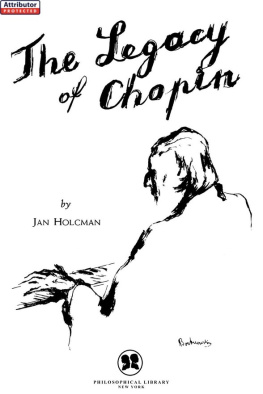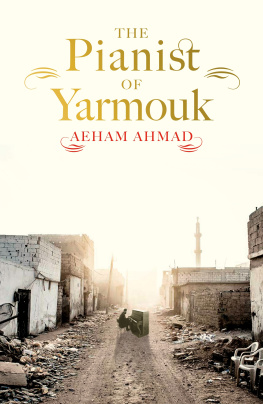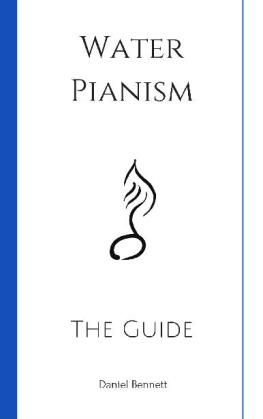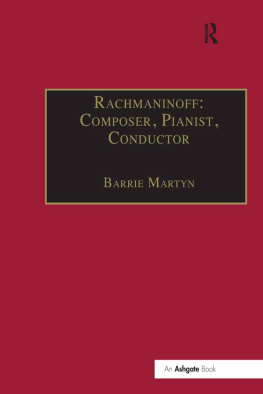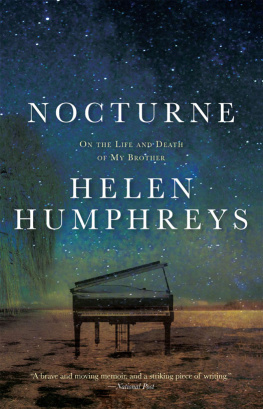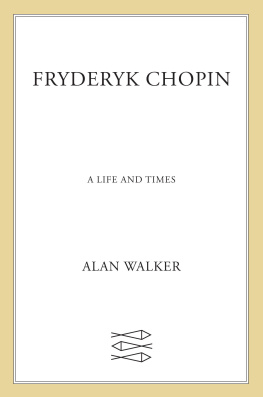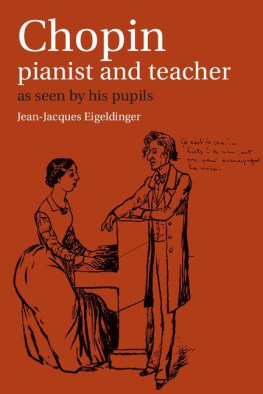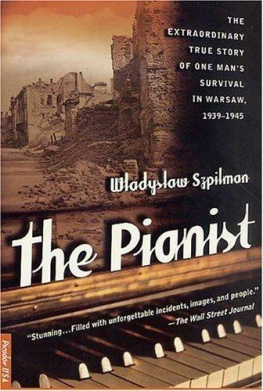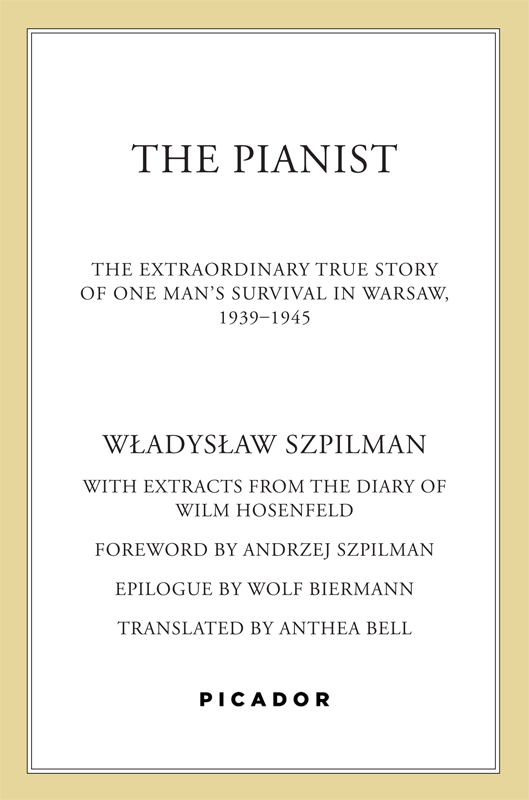
Wadysaw Szpilmanphotograph taken for his identity card, 1942

The author and publisher have provided this e-book to you for your personal use only. You may not make this e-book publicly available in any way. Copyright infringement is against the law. If you believe the copy of this e-book you are reading infringes on the authors copyright, please notify the publisher at: us.macmillanusa.com/piracy.
Contents
Foreword
Until a few years ago my father never spoke of his wartime experiences. Yet they had been my companions since childhood. Through this book, which I surreptitiously took from a corner of our bookshelves when I was twelve years old, I discovered why I had no paternal grandparents and why my father never talked about his family. The book revealed a part of my own identity to me. I knew he knew I had read it, but we never discussed it, and perhaps for that reason it never struck me that the book could be of any significance to other people something pointed out by my friend Wolf Biermann when I told him my fathers story.
Ive lived in Germany for many years, and I am always conscious of the painful absence of communication between Jews and the Germans and Poles. I hope this book will help to close some of the wounds that are still open.
My father Wadysaw Szpilman is not a writer. By profession he is what they call in Poland a man in whom music lives: a pianist and composer who has always been an inspiring and significant figure in Polish cultural life.
My father completed his piano studies with Arthur Schnabel at the Berlin Academy of Arts, where he also studied composition with Franz Schreker. When Hitler came to power in 1933, he returned to Warsaw and began working as a pianist for Polish Radio. By 1939 he had composed scores for a number of films, as well as many lieder, chansons and songs which were very popular at the time. He played before the war with the internationally famous violinist Bronislav Gimpel, Henryk Schoering and other renowned musicians.
After 1945 he began working for Polish Radio again, and returned to concert performance as a soloist and in chamber ensembles. He wrote several symphonic works and some three hundred popular songs, many of them great hits. He also composed music for children, incidental music for radio plays, and more film scores.
He was head of the music department of Polish Radio until 1963, when he gave up the position to devote more of his time to concert tours and the Warsaw Piano Quintet founded by himself and Gimpel. After giving more than two thousand concerts and recitals all over the world, my father retired from public concert life in 1986 to devote himself entirely to composing.
It is a private regret of mine that his compositions are still almost unknown in the western world. One reason, I think, is the division of Europe into two halves culturally as well as politically after the Second World War. Throughout the world, light, entertaining music reaches far more people than serious classical music, and Poland is no exception. Its people have grown up with my fathers songs, for he shaped the Polish popular music scene over several decades but the western frontier of Poland constituted a barrier to music of that kind.
My father wrote the first version of this book in 1945, I suspect for himself rather than humanity in general. It enabled him to work through his shattering wartime experiences and free his mind and emotions to continue with his life.
The book was never reprinted, although during the 1960s a number of Polish publishing firms tried to make it available for a younger generation. Their efforts were always thwarted. No explanation was given, but the real explanation was obvious: the political authorities had their reasons.
More than fifty years after its first edition, the book has now been published a useful lesson, perhaps, to many good people in Poland, and one that may persuade them to reissue it in their own country.
Andrzej Szpilman
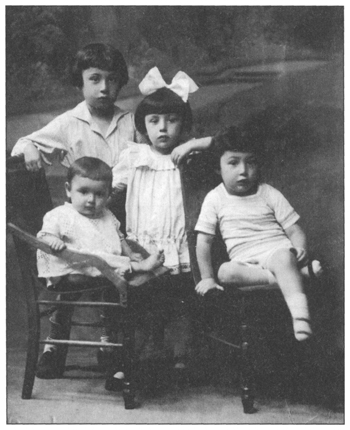
Wadysaw Szpilman with his siblings, Halina, Regina, and Henryk, 1914
1 The Hour of the Children and the Mad
I began my wartime career as a pianist in the Caf Nowoczesna, which was in Nowolipki Street in the very heart of the Warsaw ghetto. By the time the gates of the ghetto closed in November 1940, my family had sold everything we could sell long ago, even our most precious household possession, the piano. Life, although so unimportant, had none the less forced me to overcome my apathy and seek some way of earning a living, and I had found one, thank God. The work left me little time for brooding, and my awareness that the whole family depended on what I could earn gradually helped me to overcome my previous state of hopelessness and despair.
My working day began in the afternoon. To get to the caf I had to make my way through a labyrinth of narrow alleys leading far into the ghetto, or for a change, if I felt like watching the exciting activities of the smugglers, I could skirt the wall instead.
The afternoon was best for smuggling. The police, exhausted by a morning spent lining their own pockets, were less alert then, busy counting up their profits. Restless figures appeared in the windows and doorways of the blocks of flats along the wall and then ducked into hiding again, waiting impatiently for the rattle of a cart or the clatter of an approaching tram. At intervals the noise on the other side of the wall would grow louder, and as a horse-drawn cart trotted past the agreed signal, a whistle, would be heard, and bags and packets flew over the wall. The people lying in wait would run out of the doorways, hastily snatch up the loot, retreat indoors again, and a deceptive silence, full of expectation, nervousness and secret whispering would fall over the street once more, for minutes on end. On days when the police went about their daily work more energetically you would hear the echo of shots mingling with the sound of cartwheels, and hand grenades would come over the wall instead of bags, exploding with a loud report and making the plaster crumble from the buildings.
The ghetto walls did not come right down to the road all along its length. At certain intervals there were long openings at ground level through which water flowed from the Aryan parts of the road into gutters beside the Jewish pavements. Children used these openings for smuggling. You could see small black figures hurrying towards them from all sides on little matchstick legs, their frightened eyes glancing surreptitiously to left and right. Then small black paws hauled consignments of goods through the openings consignments that were often larger than the smugglers themselves.
Once the smuggled goods were through the children would sling them over their shoulders, stooping and staggering under the burden, veins standing out blue at their temples with the effort, mouths wide open and gasping painfully for air, as they scurried off in all directions like scared little rats.
Their work was just as risky and entailed the same danger to life and limb as that of the adult smugglers. One day when I was walking along beside the wall I saw a childish smuggling operation that seemed to have reached a successful conclusion. The Jewish child still on the far side of the wall only needed to follow his goods back through the opening. His skinny little figure was already partly in view when he suddenly began screaming, and at the same time I heard the hoarse bellowing of a German on the other side of the wall. I ran to the child to help him squeeze through as quickly as possible, but in defiance of our efforts his hips stuck in the drain. I pulled at his little arms with all my might, while his screams became increasingly desperate, and I could hear the heavy blows struck by the policeman on the other side of the wall. When I finally managed to pull the child through, he died. His spine had been shattered.


